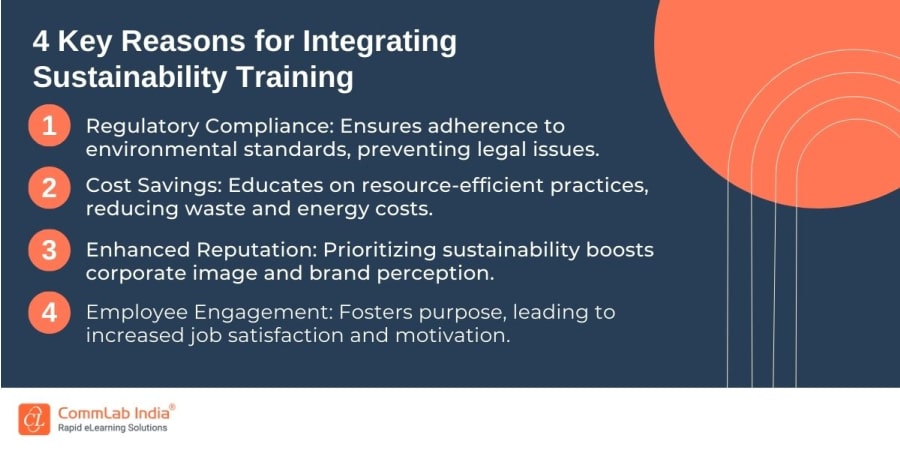How to Integrate Sustainability into Existing Training Programs?

Imagine a future where your business thrives not just financially, but also environmentally and socially. This isn't some utopian dream; it's a reality within reach for organizations embracing sustainability. But achieving this future requires a shift in mindset and a commitment to responsible practices. One powerful tool for driving this change? Integrating sustainability training into your existing employee training and development programs.
What is Sustainability?
Sustainability is a comprehensive approach to progress that ensures we meet the needs of the present without compromising the ability of future generations to meet their own.
The Sustainability Triangle:
- Environmental: Minimizing our impact on resources like water, air, and ecosystems.
- Social: Prioritizing fair labor practices, diversity, and community well-being.
- Economic: Focusing on long-term financial viability and responsible resource management.
What are the Benefits of Integrating Sustainability Training into Existing Training?
Integrating sustainability training into existing programs offers a multitude of benefits for your organization, your employees, and the environment:
- Enhanced Employee Engagement: Sustainability resonates with a growing number of individuals. By incorporating sustainability training, you demonstrate a commitment to environmental and social responsibility, leading to a more engaged and motivated workforce. Employees who feel their values align with the company's mission are more likely to be productive and enthusiastic about their work.
- Cost Savings: Many sustainable practices lead to cost savings. Training employees on energy efficiency in the workplace, for example, can significantly reduce utility bills. Similarly, training on reducing paper waste can save on printing and paper costs.
- Positive Brand Image: Consumers are increasingly making purchasing decisions based on a company's commitment to sustainability. Implementing sustainability training showcases your dedication to environmental and social responsibility, enhancing your brand image and attracting eco-conscious customers and talent.
- Improved Regulatory Compliance: Environmental regulations are constantly evolving. Sustainability training helps employees stay up-to-date on relevant regulations, reducing the risk of non-compliance and potential fines.
- Innovation and Problem-Solving: Sustainability training encourages employees to think critically about resource consumption and waste reduction. This fosters a culture of innovation, leading to creative solutions and potential cost-saving initiatives.

What are the Different Digital Formats to Deliver Sustainability Training?
Integrating sustainability training doesn't necessitate a complete overhaul of your existing programs. Here's how you can leverage digital learning methods to seamlessly incorporate sustainability principles:
- eLearning Modules: eLearning modules offer a flexible and cost-effective way to introduce sustainability concepts to a wide audience. Develop interactive modules that cover topics like reducing energy consumption in the workplace, minimizing paper waste, and green commuting options. These modules can be easily integrated into existing training platforms or accessed on demand.
- Virtual Instructor-Led Training (VILT): VILT sessions allow for live interaction with instructors while maintaining a remote learning environment. Utilize VILT sessions to delve deeper into specific sustainability topics, host Q&A sessions with sustainability experts, or conduct case studies that showcase successful sustainability initiatives implemented by other companies.

- Microlearning: The concept of microlearning, delivering bite-sized learning modules in short bursts, makes it perfect for integrating sustainability into existing training programs. Develop short, engaging videos or infographics that highlight quick tips for sustainable practices. These microlearning modules can be seamlessly woven into existing training sessions or delivered as daily or weekly reminders.
- Gamification: Gamification injects a fun and engaging element into training. Develop online games or quizzes that test employees' knowledge of sustainability practices and reward them with points or badges for participation. This healthy dose of competition can increase learner engagement and knowledge retention.
- Social Learning: Create online forums or communities where employees can share sustainability best practices, success stories, and eco-friendly tips. This fosters a collaborative learning environment where employees can learn from each other and inspire positive change.
→ Download Now: eLearning for Sustainability Training [Case Study]
How Can Social Learning Be Fostered in a Remote Workforce? [Video]
How to Integrate Sustainability Beyond Training Content?
While training content is crucial, consider these additional ways to integrate sustainability into existing programs:
- Green Office Initiatives: Implement practical changes within the office environment. Encourage recycling, use energy-efficient appliances, and provide access to bike racks or promote carpooling to promote sustainable commuting.
- Sustainability Awards and Recognition: Recognize and reward employees who exhibit sustainable behaviors in the workplace. This could include acknowledging employees who actively conserve energy, reduce paper consumption, or implement innovative green initiatives.
- Supplier Selection: Integrate sustainability considerations into your supplier selection process. Partner with vendors who prioritize sustainable practices and use eco-friendly materials in their products.
Conclusion: Building a Sustainable Future, One Training Program at a Time
Integrating sustainability into your training programs is a journey, not a destination. By incorporating digital learning methods, fostering a collaborative learning environment, and implementing green practices within the workplace, you can empower your employees to become eco-conscious leaders and contribute to a more sustainable future. Remember, small changes implemented consistently can have a significant impact on your company's environmental footprint and overall sustainability efforts. Start integrating sustainability training today and watch your employees become not only skilled professionals, but also responsible stewards.
Ready to green your training? See how eLearning boosts sustainability training! Download the Free Case Study: "eLearning for Sustainability Training."




![What are the Key Components of Sustainability Training? [Infographic]](https://blog.commlabindia.com/hubfs/blogs/sustainability-training-key-components-info.jpg)
